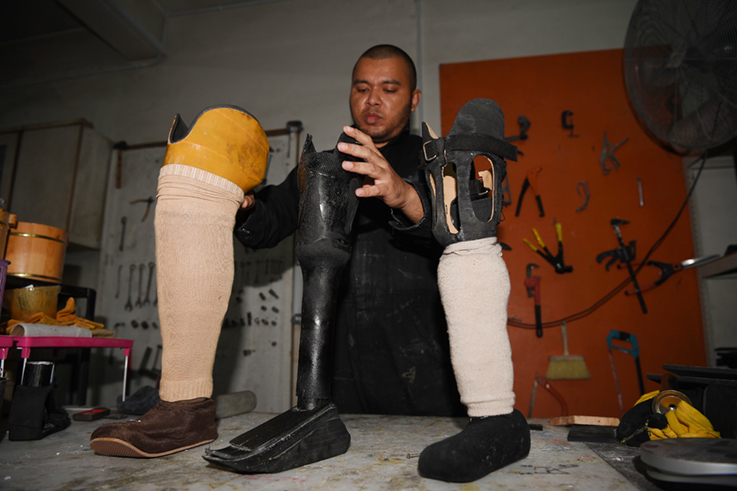Interestingly, Kedidi Global Enterprise produces 100% handmade prosthetics that are not only of good quality, but also light and durable.
A COUPLE’S social enterprise that makes and supplies reasonably-priced prosthetic legs has brought a ray of sunshine to disabled people from the needy communities.
Kedidi Global Enterprise, owned by Datuk Abdullah Md Yunus, 64, and his wife Datin Noorshan Ibrahim, 63, offers the artificial limbs for half the market price.
Interestingly, Kedidi Global Enterprise — located in Seri Kembangan, Selangor, and incorporated in November 2017 — produces 100% handmade prosthetics that are not only of good quality, but also light and durable.
Noorshan told Bernama she and her husband are running their company as a social enterprise to enable the needy people with disabilities to purchase prosthetic limbs at more affordable rates.
“The market price for an artificial leg below the knee is about RM5,000 and above the knee, between RM7,000 and RM10,000,” she said.
‘Mobility is Life’ Programme
Since September 2018, Kedidi Global has been collaborating with insurance company Prudential BSN Takaful Bhd (PruBSN) to provide free prosthetic legs to underprivileged disabled persons.
The initiative is being carried out under PruBSN charity wing’s Mobility is Life programme.
PruBSN acting CEO Wan Saifulrizal Wan Ismail said a total of 43 deserving people received free artificial limbs under the programme for the 2018/2019 period.
He said PruBSN purchased the prosthetics from Kedidi Global at about RM2,600 (below the knee) and RM3,600 (above the knee) each.
Recalling the company’s first customer Shaharudin Taib, who contacted them in its second month of operation, Noorshan said his left leg was amputated due to diabetes and he could not afford to buy an artificial limb.
“He called us after he found out about us from Facebook. My husband and I then went to Batu Pahat (Johor) where he lived to get his leg measurements.
“He was so happy with our product and we didn’t charge him a single sen because we felt sorry for him as he didn’t have any family member or relative,” she said, adding that Shaharudin passed away in mid-2018.
“Nevertheless, his story inspired Kedidi Global Enterprise to help those who can’t afford to buy artificial limbs.”
Kedidi Global has come up with its own innovations in the making of prosthetic limbs and since every process is 100% handmade
Production Process
At Kedidi Global’s factory, Noorshan and Abdullah’s son Syafiq Abdullah, 32, is among the skilled workforce involved in making the prosthetics.
Each artificial leg has three components, namely socket, pylon and foot, and according to Syafiq, the production process can be mentally challenging as the measurements differed from one customer to another.
The socket is the most crucial component of the prosthetic limb as it connects the residual limb to the prosthesis and ensures the comfort of the wearer.
“First, we have to measure the limb stump (where the leg is amputated) by using a measuring tape. We also make a mould (of the stump) using plaster of Paris (POP) to get the shape of the socket right for each customer,” he explained, adding that the POP mould would take three to five hours to dry up and harden.
The mould is then rectified to suit the wearer’s measurements after which it is wrapped with a fibreglass material and coated with resin. The chemical reaction of the resin on the fibreglass over a period of four hours will cause the mould to cure, following which, the POP is broken and removed and what remains is the fibreglass socket.
“To make the socket, we use fibreglass because it is strong yet light,” said Syafiq.
The second component, the pylon, which connects the socket to the foot, is also made of fibreglass. This process takes about three to five hours.
For the final component — the foot — the company offers three types of prostheses for the comfort of the wearer, namely T1 where the inner part is made of wood and the outer part rubber; T2 wood (inner) and plastic (outer); and T3 which is made of fibreglass or carbon fibre.
“T3 itself has three models, namely T3L, T3U and T3S, the last one being our most sophisticated model which is fitted with a pliable energy storage-energy release system,” Syafiq said, adding that the entire process of making an artificial limb can take a day.
He also said Kedidi Global has come up with its own innovations in the making of prosthetic limbs and since every process is 100% handmade, “we need high levels of diligence and patience to do the work properly”.
Customers Satisfied
Hassan Saka, 25, who was born without his right leg, and Umi Kalthom Ibrahim, 44, whose right leg was amputated in 2017 due to diabetes, were among those who recently received free prosthetic limbs under PruBSN’s Mobility is Life programme.
Hassan, who is from Tawau, Sabah, said his life changed in the wink of an eye after he started wearing the artificial limb.
“After so long, finally I managed to get a job in an ice cream factory in Shah Alam, Selangor.
Now, I don’t have to be dependent on others.
“As a child, I could only move around on the floor by using my hands to drag my body.
When I was six years old, I started using crutches,” he said, adding that he came across the Mobility is Life initiative on Facebook.
Umi Kalthom, a sweeper at a school in Teluk Intan, Perak, said she had to take leave after her leg was amputated in 2017.
“Now that I have an artificial leg, I am able to return to work and earn an income for my family,” said the mother-of-three whose husband works as a carpenter.


